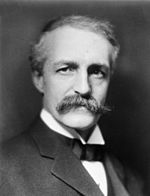
Gifford Pinchot
American forester and politician (1865-1946)
Peter Joachim Gaywas a German-American historian, educator, and author. He was a Sterling Professor of History at Yale University and former director of the New York Public Library’s Center for Scholars and Writers (1997-2003).
Table of Contents
Peter Joachim Gaywas a German-American historian, educator, and author. He was a Sterling Professor of History at Yale University and former director of the New York Public Library’s Center for Scholars and WritersAward for Scholarly Distinction in 2004. He authored over 25 books, including The Enlightenment: An Interpretation, a two-volume award winner; Weimar Culture: The Outsider as Insider (1968); and the widely translated Freud: A Life for Our Time (1988).
Gay was born in Berlin in 1923, left Germany in 1939 and emigrated, via Cuba, to the United States in 1941. From 1948 to 1955 he was a political science professor at Columbia University, and then a history professor from 1955 to 1969. He left Columbia in 1969 to join Yale University’s History Department as Professor of Comparative and Intellectual European History and was named Sterling Professor of History in 1984.
Gay was the interim editor of The American Scholar after the death of Hiram Haydn in 1973 and served on that magazine’s editorial board for many years. Sander L. Gilman, a literary historian at Emory University, called Gay “one of the major American historians of European thought, period”.
Every historian has informally an anthropology, without ever using the word.
German-American historian and author (1923-2015)
And my interest in history was, and remains, very strong: what I wanted was to understand certain things better by understanding them psychoanalytically.
German-American historian and author (1923-2015)
There is something very intriguing about, for example, the sense of accomplishment that a small child has, which you might be able to reduce to aggression and libido, but which might also have some independent existence.
German-American historian and author (1923-2015)
To have a liberal temperament is a kind of psychological boon, To be able to understand that someone you disagree with is not just a terrible creature but somebody with whom you disagree.
German-American historian and author (1923-2015)
People seem to forget that one reason they are now thinking differently is Freud’s legacy itself.
German-American historian and author (1923-2015)
My definition of modernism took a while to develop.
German-American historian and author (1923-2015)
What interests me, and has always interested me, has been modernism.
German-American historian and author (1923-2015)
My assumption is that fundamentally the picture of the human animal, as developed by Freud, is largely right.
German-American historian and author (1923-2015)